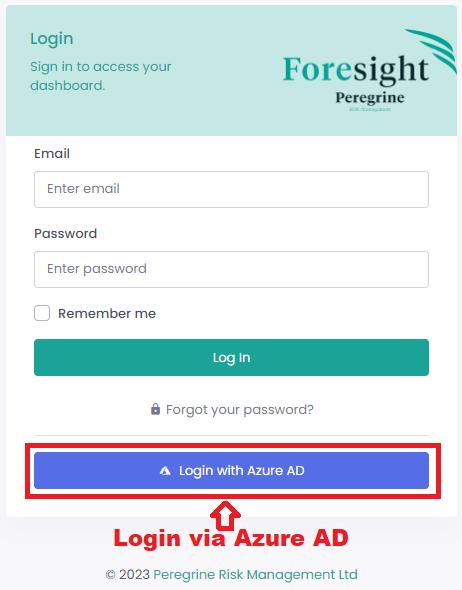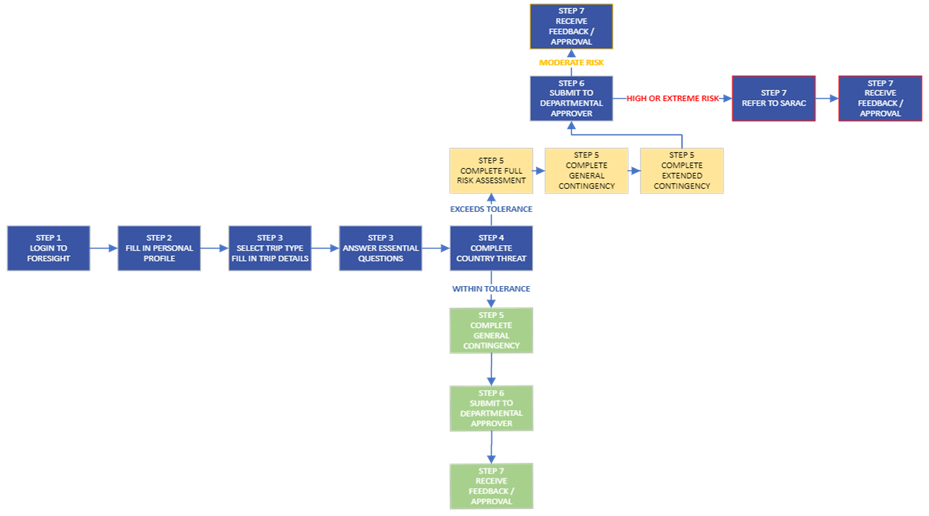Travel and Working Away
Following your feedback, a number of changes to the trip configurations within Peregrine Foresight have recently been introduced..
In brief this involved:
- Replacing the current 18 trip types with 4, to cover Conference-type activity and Fieldwork.
Any trips created using the old templates are no longer able to be duplicated.
Further work to develop trip types for Laboratory work, UG Year Abroad and Organised Group trips will take place in Easter Term.
Once the new trip types are added, new "How to" videos will be developed for the website which show the sequence of questions and take people through an example.
Future developments:
- Peregrine is working on some significant developments to Foresight as a result of feedback from ourselves and other Higher Education clients. In particular our request for an interim approval stage to allow for review of risk assessments by eg: a PI or PhD supervisor before sending on to the Approver.
- Looked at exploring how we can link completion of a risk assessment within Foresight to automatic registration for University travel insurance, so we can eliminate an administrative step for travellers. An initial look suggests that this might be easier than at first thought, which is promising.
Many thanks again for all your help trialling the new system and I looking forward (I think!) to further feedback.
***********************************************************************
Pre-travel risk assessment pilot
Since the launch of Peregrine Foresight for pre-travel risk assessments the University Safety Office (USO) has been reviewing feedback from the five pilot departments and others that have taken an interest in the new system. For the moment, the only UK trips that will require risk assessments will be those involving fieldwork, laboratory work and site visits.
CUED confirms that the previous Departmental low risk travel risk assessment on-line form remains available for staff to submit and can be found here: Low Risk Travel Risk Assessment Form Students should solely submit assessments using the Peregrine Foresight system following the guidance below.
From 9 November 2023, the Department of Engineering has been taking part in a pilot to use Peregrine Foresight to manage pre-travel risk assessments.
Peregrine Foresight is an online system which allows travellers to create a pre-travel risk assessment, send it to a departmental approver, and receive feedback and approval. It is designed to replace the current paper-based templates, and provide a modern and more efficient system for recording travel by staff and students as well as creating and approving pre-travel risk assessments. Foresight calculates for you the level of risk associated with the trip and then directs you to completing an appropriate risk assessment; minimal for low risk trips, fuller for medium and higher risk trips. It also contains intelligence information about destination countries which you can refer to when completing your risk assessment.
Full information about how to access and use Peregrine Foresight can be found on the Safeguarding Study and Work Away website. This includes ‘how to’ videos and Frequently Asked Questions.
NOTE: When you first go into the system you should log in via the blue button 'Login with Azure ID'. This will take you straight in using your Raven credentials as it's a single sign on application.
Help with using the system is also available by emailing internationalsupport@admin.cam.ac.uk (Mon-Fri, 09:00 – 17:00).
When selecting the departmental approver please select Approvers Engineering. Once you have completed and submitted the assessment, the CUED Safety Office will be notified that your travel assessment is awaiting a review and approval. The CUED Safety Office will obtain any additional sign offs for medium or high risk travel.
To ensure an assessment is reviewed and approved prior to the travel start date of the assessment, the following timelines should be aimed for whenever possible:
- Low risk – 6 days
- Medium risk – 14 days
- High risk – 2-3 months
As we are one of the first faculties and departments to be using the new system, feedback on our experience is very important to inform the wider rollout to the rest of the University. Although the system has been tested there will be issues which will only become apparent through use in real life. There may be changes in the configuration necessary to accommodate what happens in practice. Feedback/reflections can be sent to both safety-office@eng.cam.ac.uk and internationalsupport@admin.cam.ac.uk .


